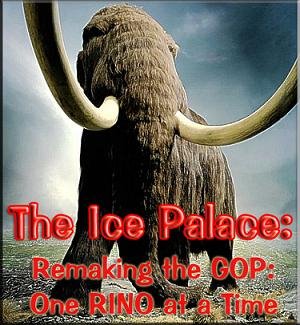On riling the RINOs--give 'em hell, George!
This aspect that protects the President's right to act in matters of national security seems to have a particularly nasty effect on the RINOs in the Senate, who would prefer to have a Geneva Convention-styled "terrorist bill of rights" to those who wear no uniform and who hide amongst women and children while conducting warfare:WASHINGTON (AP) -- Sen. John McCain thought he had a deal when President Bush, faced with a veto-proof margin in Congress, agreed to sign a bill banning the torture of detainees. Not quite. While Bush signed the new law, he also quietly approved another document: a signing statement reserving his right to ignore the law. McCain was furious, and so were other lawmakers.
The Senate Judiciary Committee is opening hearings this week into what has become the White House's favorite tool for overriding Congress in the name of wartime national security.
"It's a challenge to the plain language of the Constitution," the committee's chairman, Sen. Arlen Specter, R-Pa, said in an interview with The Associated Press. "I'm interested to hear from the administration just what research they've done to lead them to the conclusion that they can cherry-pick."
Apparently, enough to challenge more than 750 statutes passed by Congress, far more than any other president, Specter's committee says. The White House does not dispute that number, but points out that Bush is far from the nation's first chief executive to issue them.

"Signing statements have long been issued by presidents, dating back to Andrew Jackson all the way through President Clinton," White House spokeswoman Dana Perino said Monday.
Specter's first hearing Tuesday is about more than the statements. He's been keeping a laundry list of White House practices he bluntly says could amount to abuses of executive power - from warrantless domestic wiretapping program to sending up officials who refuse on national security grounds to answer questions at hearings.
But the hearing also is about countering any influence Bush's signing statements may have on court decisions regarding the new laws. Courts can be expected to look to the legislature for intent, not the executive, said Sen. John Cornyn, R-Texas., a former state judge.
"There's less here than meets the eye," Cornyn said. "The president is entitled to express his opinion. It's the courts that determine what the law is."
But Specter and his allies maintain that Bush, in practical terms, is doing an end-run around the veto process in the name of national security. In the sixth year of his presidency, Bush has yet to issue a single veto.
Rather than give Congress the opportunity to override a veto with a two-thirds majority in each house, he has issued hundreds of signing statements invoking his right to interpret the law on everything from whistleblower protections to how Congress oversees the USA Patriot Act.
As well as it should be. As being ultimately responsible in matters of national security, the Executive branch has the sole purview of how it prosecutes war in a manner that is consistent with maintaining national security. Congress signs the checks, but it is the President who determines how to handle our enemies. Much to the chagrin, of course, of our sad cadre of RINOs.Bush's signing statement in March on Congress's renewal of the Patriot Act particularly riled Specter and others who labored for months to craft a compromise between Senate and House versions, and what the White House wanted. Reluctantly, the administration gave in on its objections to new congressional oversight of the way the FBI searches for terrorists.
Bush signed the bill with much flag-waving fanfare. Then he issued a signing statement asserting his right to bypass the oversight provisions in certain circumstances.
(Filed under RINOs, the fifth column, war on terror)















|